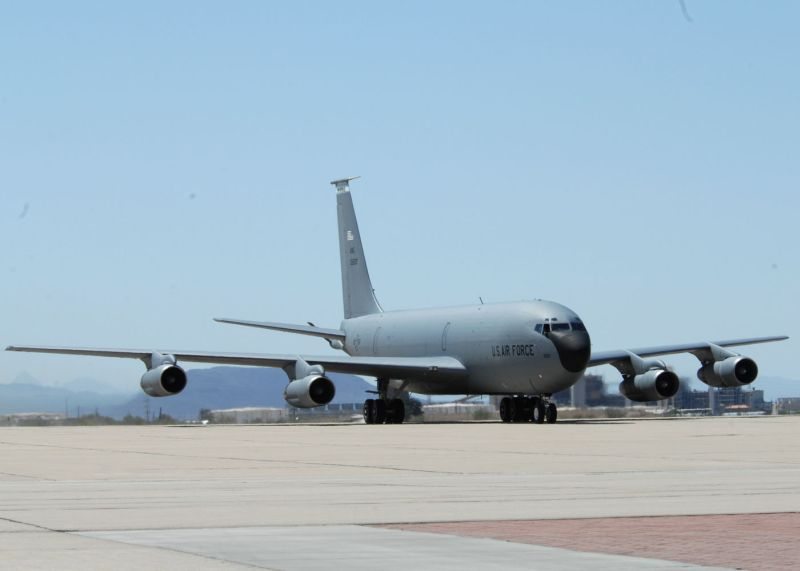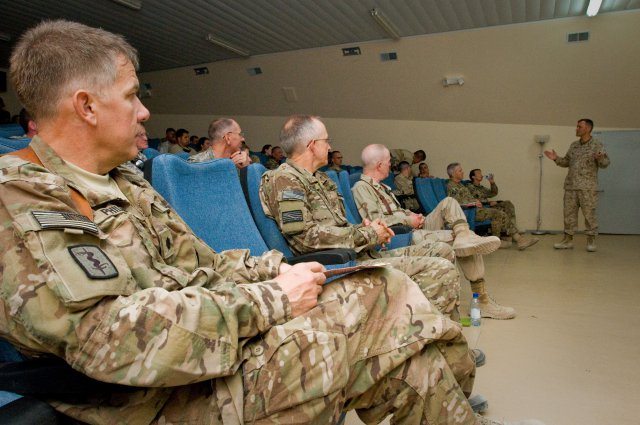The U.S. Air Force has gone to the ends of the earth to support operations in Afghanistan.
A KC-135 Stratotanker flew north until it started flying south June 21 an 22, cutting a new pathway over the Arctic Circle and the North Pole between Fairchild Air Force Base, Wash., and the Transit Center at Manas, Kyrgyzstan. It was the first time an Air Force air refueling tanker has ever flown this route.
The mission followed another historic flight that took place June 5 and 6 when a C-5M Super Galaxy traversed the Arctic Circle to fly the first direct-delivery airlift mission from Dover AFB, Del., to Bagram Airfield, Afghanistan.
A 2009 U.S.-Russia transit agreement helped make the new Arctic routes possible, according to U.S. Transportation Command officials. The KC-135 flight over the North Pole alone saved the Air Force approximately 4.5 hours and $54,000.
“These routes give us interesting new options and open new corridors,” said Maj. Chris Fuller, a plans chief at the 618th Air and Space Operations Center at Scott AFB, Ill.
The Fairchild tanker crew flew to Manas, a key air refueling base for Afghanistan operations, as part of an “iron swap” to deploy the aircraft and four Airmen here. Air Force aircrews can use Russian air space for “iron swaps,” as well as to transport passengers and cargo, Major Fuller said.
Typically, KC-135 crews doing tanker swaps from Fairchild fly to England, stay the night and fly to Kyrgyzstan the next day. By circumventing England, the KC-135 polar over-flight crew saved two days of mandatory crew rest, including their anticipated return from Manas. The two days were added to their deployment time at Manas, said 1st Lt. Remington Barnes, a 92nd Air Refueling Squadron pilot from Fairchild AFB.
While a few hours and thousands of dollars may not seem like much, projected savings could be remarkable, officials said. The Air Force is the DOD’s largest fuel customer, and Air Mobility Command consumes approximately 60 percent of the Air Force’s fuel. Fuel savings such as those accrued by more direct routes “can be used to recapitalize the aging fleet as well as provide for incentives that support more ideas to improve fuel efficiency,” said Lt. Col. Marc Gildner from the AMC Fuel Efficiency Office.
With budget constraints, the ability to back incentives that inspire efficiency is invaluable.
As Undersecretary of the Air Force Erin Conaton said during a 2010 visit to AMC, fuel savings can help AMC “reinvest those dollars in things that make the mobility air forces as highly effective as possible.”
New routes like the KC-135 polar over-flight also help AMC aircrews more effectively support combatant commanders.
Such shifting of resources comes at a crucial period when tankers are in higher demand than ever, statistics show. For example, when NATO operations in Libya began, KC-135s provided refueling support to the aircraft enforcing the no-fly zone. Meanwhile, the need for tankers in Afghanistan didn’t let up, explained Maj. Jeff Schrum, the aircraft commander for KC-135 polar over-flight mission.
Air refueling crews have continually set records since Sept. 11, 2001.
“Our tanker crews underwrite America’s ability to project power rapidly,” said Gen. Raymond E. Johns Jr., the AMC commander. “They provide the bridge for global reach, enabling us to provide the right effects to the right place at the right time.”
The Arctic over-flight KC-135 had a combined aircrew of active duty and Air National Guard Airmen. In addition to Major Schrum and Lieutenant Barnes, the mission was completed by Lt. Col. Thorne Tibbitts; Capt. Jared Gude; Staff Sgt. Randy Miller; Staff Sgt. Jason Tolbert; Senior Airman Justin Holbrook; and Senior Airman Timothy Slagle.
The flight, made possible by close diplomatic cooperation and months of operational planning, could open doors for future efficiencies as well as strengthen global partnerships.










